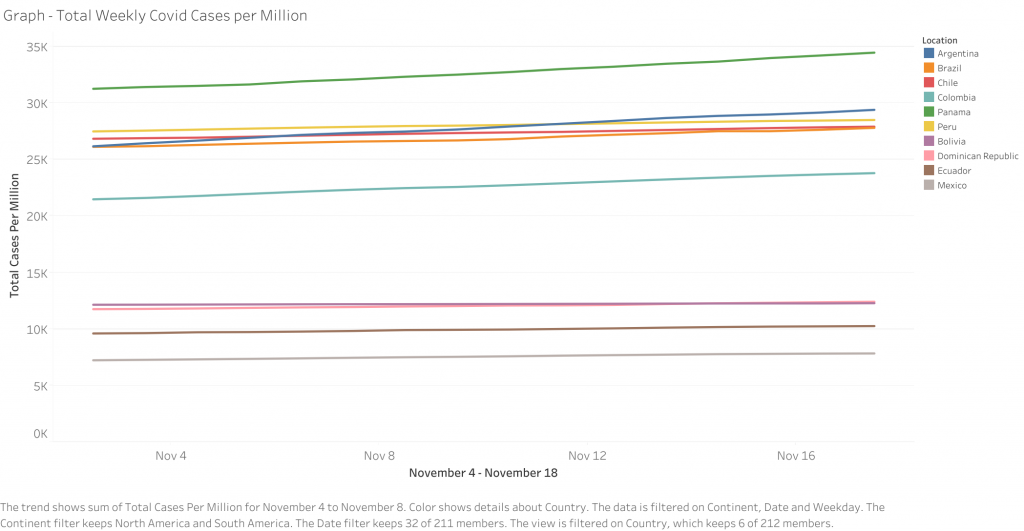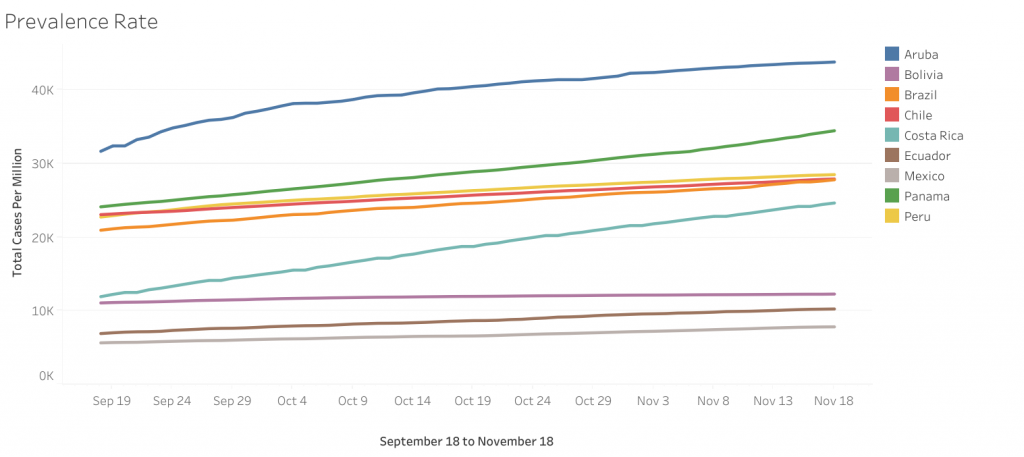What you should know
- $15 billion: That’s how much World Food Program Director David Beasley warned is needed in 2021 to carry out its global food programs and avoid famines of “biblical proportions”.
- 400,000+ people: The number of Nicaraguans affected by hurricane Iota, the second Category 4 storm to hit Central America in two weeks.
- 1 million: On November 14, Mexico became the fourth Latin American country to surpass one million COVID-19 cases; Peru is not far behind. Here are this week’s figures.
- Vaccine optimism: In the past two weeks, Pfizer, Moderna, and AstraZeneca have released promising data from their COVID-19 vaccine candidates, boosting currencies and risk assets in Latin America and the Caribbean. For some vaccines, however, distribution remains a major challenge.
Quarantine + reopening plans
As COVID-19 cases continue to rise in the region, governments are enacting new measures to contain the virus.
- On November 17, Uruguay crossed 100 daily COVID-19 cases for the first time. The government requested citizens to socially distance and to wear face masks; officials are considering whether to suspend carnival, which is set to begin in January.
- In-person day care for children resumed in Paraguay this week. Children above the age of three must wear masks and parents and children alike must wash their hands before entering a space and remain six feet apart.
- On November 14, Mexico City announced new curfews on casinos, fairs, cinemas, theaters, and nightclubs after the city’s hospital occupancy rate reached 46 percent.
- Wanda Vázquez Garced, Governor of Puerto Rico, called upon the national guard to enforce the closure of the island’s beaches and its curfew. Puerto Rico’s beaches are closed — except for individual sports — from November 16 to December 11.
- Ecuador’s Committee for Emergency Operations asked mayors to suspend public and private events in December.
International travel restrictions
- On November 15, José Marti International Airport in Havana, Cuba, received its first international flight from Miami after nearly eight months.
- Paraguay lifted the quarantine requirement for travelers from Mercosur countries (Argentina, Brazil, Uruguay, and Venezuela) as long as they present a negative COVID-19 test conducted no more than 72 hours before arrival.
- Venezuela will keep its airports closed to international flights until February 11, 2021, except for flights to and from Turkey, Mexico, the Dominican Republic, Iran, and Panama.
- Jamaican Tourism Minister Edmund Bartlett praised the CDC’s decision to lift the no-sail order for cruise ships leaving US ports.
- Antigua and Barbuda threatened to bring before the Caribbean Community a decision by Barbados to classify it as high-risk; Antiguans and Barbudans will have to undergo a fourteen-day quarantine when visiting the island.
Economies in focus
Economic Impact
- According to Chilean economic newspaper Diario Financiero, optimism surrounding a COVID-19 vaccine, the election of Joe Biden, and the lifting of certain restrictions in Chile increased demand for risky assets. This adversely impacted the demand for Chile’s sovereign debt, among the safest in Latin America.
- Nicaragua’s traditional exports are buoying its economy. From January to October, exports grew by 9 percent over the previous year due to a rise in international prices.
- The pandemic has increased the demand for metals, with potential long-lasting effects. Canadian mining companies are investing five times more capital in the Mexican mining sector.
- Economic activity in Brazil rose in the third trimester. Economy Minister Paulo Guedes said low interest rates and a weak currency increased internal demand and exports.
- Colombia officially entered recession for the first time since 1999, according to new data released by its national statistic agency.
- At the end of October, Mexican tequila exports had increased by 14 percent over the previous year. Production also increased by 4 percent from January to October 2020.
Economic Relief
- The IMF and the Argentine government continued virtual negotiations to refinance $44 billion in debt after an IMF official tested positive for COVID-19.
- Mexico refinanced $6.6 billion in debt in international markets. The Finance Ministry announced issuance of two new bonds maturing in 2031 and 2061.
- The Central American Bank of Economic Integration (BCIE) will provide $2.5 billion to Central American countries for projects to confront and prevent disasters caused by climate change. This comes after two hurricanes made landfall; COVID-19 cases are expected to rise as a result.
- The Dominican Republic will distribute Mastercards loaded with approximately $26 to one million families instead of the traditional Christmas boxes.
Resilience, recovery + renewal
Digitalization is considered the leading strategic priority for companies globally. But how can businesses be agile, innovative, and data savvy, while at the same time addressing concerns around privacy, security, and integration?
In its sixth year, Baker McKenzie’s 2020 Digital Transformation & Cloud Survey: The Future of Enterprise Data captures major trends and attitudes toward the use of data through a global lens of respondents in legal, technology and procurement roles, across a large cross-section of major industries.
Some key insights from this year’s survey include:
- COVID-19 has impacted the speed of digital transformation. Of those surveyed, 58 percent across all sectors, who have not yet begun a digital transformation program, now say that the pandemic has accelerated their plans toward digitalization.
- Data privacy and cybersecurity concerns have emerged as drivers to digital transformation, accelerated by COVID-19. Almost half of respondents cited the need to “improve cybersecurity” as one of their top three drivers of accelerating digital transformation, due to the pandemic.
- Cloud remains on the top of the list of essential technology for enterprises. Survey results reveal a definite trend in companies moving toward the use of private cloud, highlighting an increase in concerns over data security (which includes cybersecurity) and disaster recovery.
For more information for how business can navigate the future of technology, media, and telecommunications in an unprecedented era, check out Baker McKenzie’s TMT Talk, a podcast featuring insights from top legal advisers in strategic technology markets.
Health + innovation
- The University of Oxford and AstraZeneca COVID-19 vaccine was found to be safe and to build immunity among all adults, including those over 70. Phase 3 trial results are expected to be published by Christmas.
- While the Pfizer and BioNTech COVID-19 vaccine was found to be 90 percent effective at preventing the virus, it is not expected to be available in rural areas of the US or outside the Western world anytime soon. The main distribution challenge is that the vaccine needs to be kept at minus 70 degrees Celcius and cold chain technology is not available even at some of the most prestigious hospitals in the United States.
- On a separate note, scientists say the efficacy of the Pfizer and BioNTech COVID-19 vaccine’s messenger ribonucleic acid (mRNA) technology could accelerate the development of new vaccines to fight future pandemics and even cancer.
- Mexican Undersecretariat of Prevention and Health Promotion, Hugo López-Gatell Ramírez, assured Mexico does not yet possess the ultra-cold-chain technology necessary to store Pfizer’s COVID-19 vaccine, but that the government is already evaluating investment possibilities in this area.
- On November 16, US biotechnology company Moderna announced its COVID-19 vaccine is 94.5 percent effective. Importantly, its vaccine does not require storage at minus 70 degrees Celcius, only at minus 20 degrees Celcius, enabling simpler distribution in Latin America and the Caribbean. Moderna, along with Pfizer, is expected to apply within weeks to the Food and Drug Administration for emergency authorization.
- Brazil’s São Paulo state is expected to begin importing the first of 46 million doses of China’s Sinovac COVID-19 vaccine this week, according to Butantan Institute director, Dimas Covas. Butantan is organizing the Phase 3 trials of Sinovac’s vaccine in Brazil. According to Dimas, the vaccines will only be used if approved by Brazil’s health regulator Anvisa. The federal government met with Pfizer representatives on November 17 and is expected to meet also with Johnson & Johnson, India’s Bharat Biotech and the makers of Russia’s Sputnik V vaccine.
Country Focus
- Peru: Francisco Sagasti was sworn in as Peru’s newest president on November 17 after Manuel Merino stepped down after less than a week. Sagasti is the fourth Peruvian President in less than five years and will remain in power (barring more political instability) until the country’s presidential election in April 2021.
By the numbers
- Cases by country: Brazil (5,911,758) #3 worldwide, Argentina (1,329,005) #8 worldwide, Colombia (1,211,128) #10 worldwide, Mexico (1,011,153) #11 worldwide, Peru (939,931) #12 worldwide, Chile (534,558) #19 worldwide, Ecuador (181,104) #38 worldwide, Panama (148,721) #42 worldwide, Bolivia (143,473) #43 worldwide, Dominican Republic (134,697) #46 worldwide, Source: worldometers.info
- Prevalence rate (total cases per million people): Aruba (43,726) #9 worldwide, Panama (34,264) #15 worldwide, Argentina (29,303) #21 worldwide, Peru (28,358) #22 worldwide, Chile (27,873) #24 worldwide, Brazil (27,737) #25 worldwide, Costa Rica (24,569) #29 worldwide, Colombia (23,706) #31 worldwide, Bahamas (18,527) #48 worldwide, Saint Martin (16,832) #52 worldwide, Source: worldometers.info
- Deaths per capita (deaths per million people): Brazil (166,743) #2 worldwide, Mexico (99,026) #4 worldwide, Argentina (36,106) #10 worldwide, Peru (35,317) #11 worldwide, Colombia (34,381) #13 worldwide, Chile (14,897) #16 worldwide, Ecuador (13,025) #19 worldwide, Bolivia (8,866) #26 worldwide, Guatemala (3,947) #37 worldwide, Source: worldometers.info
Quick take


Sponsored By

